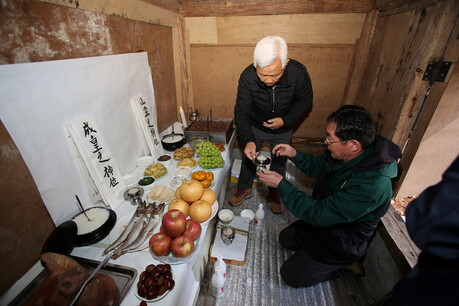Directed by Lee Gye-byeok, 'Luck-Key' tells the hilarious story of an unlikely identity swap between two completely different men. The film centers around Hyung-Wook, played by veteran actor Yu Hae-jin, a charismatic and highly skilled contract killer with a perfect professional record. However, his dangerous career takes an unexpected turn when he suffers an epic slip in a public bathhouse, resulting in a serious accident that requires immediate medical attention. Paramedics, including the attractive Ri-Na (portrayed by Jo Yoon-hee), rush him to the hospital for emergency treatment.
Meanwhile, Jae-Sung, played by Lee Joon, is a struggling actor who can barely make ends meet and is unable to even pay his monthly rent. By pure coincidence, Jae-Sung witnesses the well-dressed hit man's dramatic fall at the bathhouse. Acting on a sudden whim and perhaps seeing an opportunity to escape his own troubles, Jae-Sung makes a fateful decision to switch their locker keys, inadvertently exchanging their entire identities in the process.
When Hyung-Wook eventually regains consciousness in the hospital, he discovers that he has completely lost his memory of his deadly past and dangerous profession. To his confusion and shock, he learns that according to his new identity, he is actually Jae-Sung, a broke and unsuccessful actor struggling to survive in the competitive entertainment industry. Meanwhile, the real Jae-Sung must navigate the complex and dangerous world of a professional assassin, despite having no experience or skills in that deadly field.
Both men find themselves forced to embrace their dramatically different new lives, leading to a series of comedic situations and hilarious misunderstandings as they attempt to adapt to their switched identities. The film explores themes of identity, destiny, and the unexpected ways life can change in an instant, all while maintaining a light-hearted and entertaining tone throughout.
Director Lee Gye-byeok's comedy proved to be a significant breakthrough for veteran character actor Yu Hae-jin, who had primarily played supporting roles throughout his career. 'Luck-Key' provided him with a rare opportunity to showcase his leading man capabilities and comedic timing as the film's main protagonist. His outstanding performance in the dual role earned him widespread critical acclaim and recognition from the Korean film industry.
Yu Hae-jin's portrayal of the memory-lost assassin garnered him prestigious nominations for Best Actor at both the Baeksang Arts Awards and the Chunsa Film Art Awards, two of South Korea's most respected film honors. Additionally, his performance earned him the top prize at the University Film Festival of Korea, further cementing his status as a versatile and talented leading actor.
The Korean Cultural Center Washington, D.C. screening will take place on Wednesday, August 13, beginning at 6:00 PM. The venue is located at 2370 Massachusetts Avenue NW in Washington, D.C. The 112-minute film will be presented in its original Korean language with English subtitles, allowing American audiences to fully appreciate the nuanced performances and cultural context while following the story through accessible translations.
Attendance at this cultural event is completely free of charge, though advance registration is required through an RSVP system. The Korean Cultural Center will also provide complimentary snacks for all attendees, making it a complete entertainment experience for those interested in Korean cinema and culture.
This screening represents part of the Korean Cultural Center's ongoing efforts to promote Korean cinema and cultural exchange between South Korea and the United States. The center regularly hosts events featuring Korean films, providing American audiences with opportunities to experience the diversity and quality of contemporary Korean entertainment, which has gained significant international recognition in recent years.
'Luck-Key' stands as an excellent example of Korean cinema's ability to blend comedy with deeper themes while maintaining broad appeal for international audiences. The film's success both domestically and in international markets demonstrates the growing global appreciation for Korean storytelling and filmmaking techniques.





























